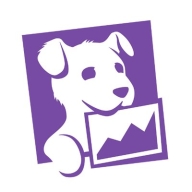

Datadog and Sumo Logic Security compete in the cloud monitoring and log analysis category. Datadog holds the upper hand due to its versatile dashboard customization and extensive integration capabilities, although Sumo Logic is favored for its simple setup and cost-effective pricing.
Features: Datadog’s extensive integrations simplify infrastructure management with intuitive dashboards and monitors for seamless automation. Sumo Logic Security offers real-time observability with diverse log source support and threat intelligence integration.
Room for Improvement: Datadog faces challenges with its complex pricing models, steep learning curve, and slow performance on large datasets, prompting the need for better logging capabilities and AI analytics. Sumo Logic requires improvements in API integrations, user interface for configuration, and documentation, with scalability and stability also needing enhancements.
Ease of Deployment and Customer Service: Datadog is widely deployed across various cloud environments, receiving mixed reviews for customer service responsiveness. Sumo Logic excels in public cloud operations with consistently praised customer support.
Pricing and ROI: Datadog offers a pay-as-you-go model, perceived as expensive but justified by its features, providing high ROI through improved monitoring efficiency. Sumo Logic’s competitive pricing and straightforward cost structure focus on data storage and scans, offering satisfactory ROI with operational benefits.
Previously we had thirteen contractors doing the monitoring for us, which is now reduced to only five.
Datadog has delivered more than its value through reduced downtime, faster recovery, and infrastructure optimization.
I believe features that would provide a lot of time savings, just enabling you to really narrow down and filter the type of frustration or user interaction that you're looking for.
When I have additional questions, the ticket is updated with actual recommendations or suggestions pointing me in the correct direction.
Overall, the entire Datadog comprehensive experience of support, onboarding, getting everything in there, and having a good line of feedback has been exceptional.
I've had a couple instances where I reached out to Datadog's support team, and they have been really super helpful and very kind, even reaching back out after resolving my issues to check if everything's going well.
They have a response time of forty-eight hours, which is not instant support.
In general, they usually provide continuous support post-implementation, being in touch and trying to help, which makes their after-sale process better than Splunk.
Datadog's scalability has been great as it has been able to grow with our needs.
We did, as a trial, engage the AWS integration, and immediately it found all of our AWS resources and presented them to us.
Datadog's scalability is strong; we've continued to significantly grow our software, and there are processes in place to ensure that as new servers, realms, and environments are introduced, we're able to include them all in Datadog without noticing any performance issues.
The tool has high scalability because everything is based in the cloud.
I did not face any significant issues with Sumo Logic Security, but the pricing may be a concern as they try to upsell and raise the prices very quickly.
Datadog is very stable, as there hasn't been any downtime or issues since I've been here, and it's always on time.
Datadog seems stable in my experience without any downtime or reliability issues.
Datadog seems to be more stable, and I really want to have a complete demo before making a call to decide on this.
If there are many records, the system may stop or the UI may become unresponsive.
The query language is pretty straightforward and easy, and it is very powerful for building different searches and dashboards that will serve for later exploration of the same interests I have.
It would be great to see stronger AI-driven anomaly detection and predictive analytics to help identify potential issues before they impact performance.
We want to be able to customize the cost part, and we would appreciate more granular access control.
The documentation is adequate, but team members coming into a project could benefit from more guided, interactive tutorials, ideally leveraging real-world data.
This can lead to alerts that are collections of disjointed signals that sometimes make no sense and lack real context; this simplistic approach makes it hard to find coherent stories during investigations.
I would also appreciate the AWS automation integrations to be more secure because currently, they are using access keys, which involves a user rather than roles, which is the security best practice recommended by AWS.
The correlation rules and log mapping are not as mature compared to other SIM tools like Splunk.
The setup cost for Datadog is more than $100.
Everybody wants the agent installed, but we only have so many dollars to spread across, so it's been difficult for me to prioritize who will benefit from Datadog at this time.
My experience with pricing, setup cost, and licensing is that it is really expensive.
This makes it more cost-effective because other solutions often include a third element in their pricing.
Our architecture is written in several languages, and one area where Datadog particularly shines is in providing first-class support for a multitude of programming languages.
Having all that associated analytics helps me in troubleshooting by not having to bounce around to other tools, which saves me a lot of time.
Datadog was able to find the alerts and trigger to notify our team in a very prompt manner before it got worse, allowing us to promptly adjust and remediate the situation in time.
The features I find most useful in Sumo Logic Security are the ease of implementation and connectors; they have a very easy connection and many connectors to important systems, making it very easy to implement and fast to start running in production.
They are able to save time on fewer alerts because we are able to perform tuning on the logs to be able to only get relevant or security relevant incidents.
If we cannot find the data in other tools, like email security or NDR, we can fetch those logs in the Log Analytics platform of Sumo Logic.
| Product | Market Share (%) |
|---|---|
| Datadog | 4.5% |
| Sumo Logic Security | 0.9% |
| Other | 94.6% |

| Company Size | Count |
|---|---|
| Small Business | 80 |
| Midsize Enterprise | 46 |
| Large Enterprise | 99 |
| Company Size | Count |
|---|---|
| Small Business | 7 |
| Midsize Enterprise | 5 |
| Large Enterprise | 13 |
Datadog integrates extensive monitoring solutions with features like customizable dashboards and real-time alerting, supporting efficient system management. Its seamless integration capabilities with tools like AWS and Slack make it a critical part of cloud infrastructure monitoring.
Datadog offers centralized logging and monitoring, making troubleshooting fast and efficient. It facilitates performance tracking in cloud environments such as AWS and Azure, utilizing tools like EC2 and APM for service management. Custom metrics and alerts improve the ability to respond to issues swiftly, while real-time tools enhance system responsiveness. However, users express the need for improved query performance, a more intuitive UI, and increased integration capabilities. Concerns about the pricing model's complexity have led to calls for greater transparency and control, and additional advanced customization options are sought. Datadog's implementation requires attention to these aspects, with enhanced documentation and onboarding recommended to reduce the learning curve.
What are Datadog's Key Features?In industries like finance and technology, Datadog is implemented for its monitoring capabilities across cloud architectures. Its ability to aggregate logs and provide a unified view enhances reliability in environments demanding high performance. By leveraging real-time insights and integration with platforms like AWS and Azure, organizations in these sectors efficiently manage their cloud infrastructures, ensuring optimal performance and proactive issue resolution.
Sumo Logic
Sumo Logic is a cloud-based machine data analytics company focusing on security, operations, and BI use cases. It provides log management and analytics services that leverage machine-generated big data to deliver real-time IT insights.
Sumo Logic is developed as a SaaS solution, it processes and analyzes large quantities of IT infrastructure data, spotting patterns and anomalies that can indicate a potential threat or significant event.
The platform is designed to help IT, security, and business operations teams develop, manage, and secure their applications and cloud infrastructures. It collects, aggregates, and analyzes data from various sources including servers, virtual machines, and network devices, providing visibility into complex systems.
What are the key features of Sumo Logic?
Real-time Analytics: Continuous queries and live dashboards that provide insights into application performance, user behavior, and security threats.
Advanced Machine Learning: Utilizes machine learning algorithms to identify trends, anomalies, and patterns.
Integrated Threat Intelligence: Tools and workflows to enhance security postures by detecting threats and anomalies.
Multi-tenant Cloud Service: Allows users to operate in a shared cloud environment securely.
The solution aims to simplify data complexity, streamline operations, and provide actionable insights to businesses across various industries.
Sumo Logic is designed to handle high data volumes from multiple sources without diminishing performance. It is primarily deployed in the cloud with seamless integrations for AWS, Google Cloud, and Microsoft Azure. This flexibility allows users to leverage Sumo Logic’s capabilities regardless of their existing cloud infrastructure.
In summary, Sumo Logic is a comprehensive, AI-driven analytics solution ideal for businesses looking to enhance their IT and security operations through data-driven insights and real-time monitoring. Its flexible deployment options and scalable pricing model make it accessible for various business sizes and sectors.
We monitor all Log Management reviews to prevent fraudulent reviews and keep review quality high. We do not post reviews by company employees or direct competitors. We validate each review for authenticity via cross-reference with LinkedIn, and personal follow-up with the reviewer when necessary.